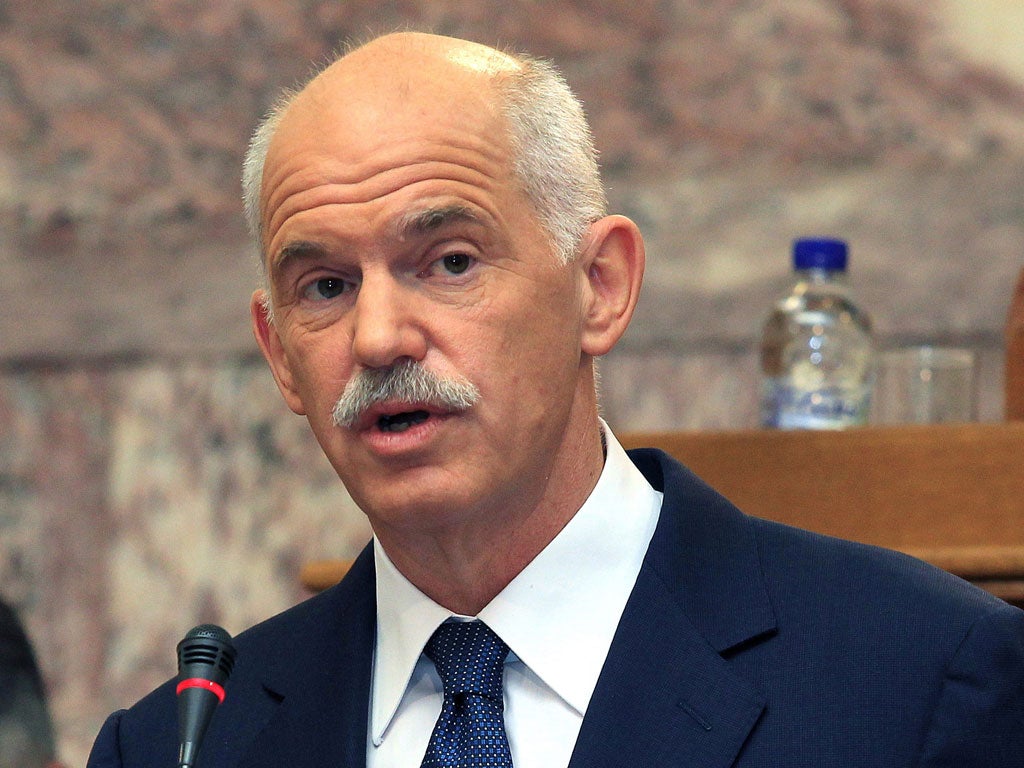Referendum turmoil threatens Greek government

Your support helps us to tell the story
As your White House correspondent, I ask the tough questions and seek the answers that matter.
Your support enables me to be in the room, pressing for transparency and accountability. Without your contributions, we wouldn't have the resources to challenge those in power.
Your donation makes it possible for us to keep doing this important work, keeping you informed every step of the way to the November election

Andrew Feinberg
White House Correspondent
Politicians in Greece's ruling Socialist party revolted today over their prime minister's surprise decision to hold a vote on a European debt deal, threatening the very survival of his embattled government.
Prime Minister George Papandreou's announcement on the public vote unleashed political and market turmoil around Europe and the world, and left observers wondering just how long his government could hold on.
One Socialist politician defected today, another called for an early election, and a third backed calls for a cross-party government to be formed to safeguard the European deal. Separately, six senior Socialist party members also called for Papandreou's resignation, Greek media reported.
The public vote would allow the Socialists — who have been vilified by an increasingly hostile public during months of strikes, sit-ins and violent protests over austerity measures — to pass the responsibility for the country's fate onto the Greek people themselves.
But it was not even clear that the government could survive a confidence vote scheduled for Friday, let alone ask the Greek people how they felt about a bailout deal that took European leaders months of intense negotiations to work out.
Politician Milena Apostolaki declared herself an independent deputy, whittling down the Socialists' majority to a mere two seats — 152 total — in the 300-member parliament.
"The crisis in the country has taken on uncontrollable dimensions and is threatening the cohesion of Greek society," Apostolaki said in her letter announcing her resignation from the party's parliamentary seat.
She described the plebiscite as "a deeply divisive procedure."
Greece has been surviving since May 2010 on a multibillion international bailout — but a second bailout is needed. European leaders held marathon negotiations last week to arrive at a new debt deal, which aims to seek 50 per cent losses for private holders of Greek bonds and provide the troubled eurozone member with 100 billion euro in additional rescue loans.
Papandreou's unexpected decision late yesterday led to markets plunging on fears that Europe's plan to save the euro will unravel. He has not set a specific question, or a date, for the referendum, although ministers said it is expected to be held early next year.
Under a new law passed just last month, a referendum can be called on issues of great national importance. But many have questioned Papandreou's motivation to call one on this debt deal, when he did not ask for a vote for Greece's first international bailout last year or for a new austerity package this year.
This would be the first referendum held in Greece since 1974, when Greeks were called on to decide whether they wanted to keep the monarchy after the fall of a seven-year dictatorship.
Another prominent Socialist deputy, Vasso Papandreou, called for a cross-party government to be formed to safeguard the European debt deal — essentially demanding the prime minister's resignation. As soon as that is done, she said, an early election should be held.
"The country is in danger of immediate bankruptcy," Vasso Papandreou, who is not related to the prime minister, told reporters outside parliament.
A third politician, Eva Kaili, backed calls for the premier's resignation, saying the referendum risks overturning the debt deal and leading Greece into bankruptcy.
The move was also greeted with shock from abroad.
Stocks plunged around the world, while French President Nicolas Sarkozy was holding an emergency meeting of top ministers to discuss Papandreou's move.
The Fitch ratings agency described the Greek premier's decision as being one that "dramatically raises the stakes for Greece and the eurozone as a whole."
A rejection of the new deal hammered out in Brussels last week "would increase the risk of a forced and disorderly sovereign default and ... potentially a Greek exit from the euro," Fitch said. "Both of which would have severe financial implications for the financial stability and viability of the eurozone."
Greek opposition leaders who have vehemently refused to back the government's rounds of austerity measures called the move a political ploy by Papandreou.
"In his attempt to save himself, Mr Papandreou set a divisive, blackmailing dilemma that endangers our future and our position in Europe," conservative New Democracy party leader Antonis Samaras said, vowing to stop the move "at all costs."
He did not give specifics on how that would be done.
AP
Subscribe to Independent Premium to bookmark this article
Want to bookmark your favourite articles and stories to read or reference later? Start your Independent Premium subscription today.
Join our commenting forum
Join thought-provoking conversations, follow other Independent readers and see their replies
Comments